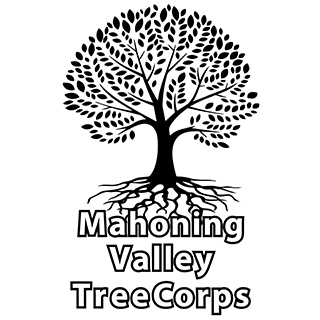Overview
Mahoning Valley TreeCorps is an initiative led by YNDC, Trumbull Neighborhood Partnership, Youngstown CityScape, the Healthy Community Partnership, along with many community partners. TreeCorps will restore and sustain the urban tree canopy in the cities of Youngstown Ohio, and Warren Ohio, in order to improve health, and make the urban forest accessible to all.
The program will: 1) develop a basic tree inventory and management plan for both cities; 2) provide forestry training to 75 local professionals and 75 young adults, create at least 5 living wage jobs, and fully involve neighborhood residents; and 3) plant and sustain 5,500 two-inch caliper trees in parks and greenspaces, and help municipal crews clear a backlog of urgent canopy maintenance issues necessary to sustain the urban forest. The program will help rebuild the canopy in areas of both cities where shade has been lost through vacant property demolition and dead tree removal efforts. Additionally, it will help alleviate the buildup of urgent tree maintenance needed in both cities, strengthen local capacity to manage and maintain the urban tree canopy, and create economic opportunities through urban forestry.
Additional community partners involved in this effort include the Cities of Youngstown and Warren, the Trumbull and Mahoning County Land Banks, Plant Ahead Ohio, Community Corrections Association, Choffin Career and Technical Center, Treez Please, Mill Creek MetroParks, Trumbull County MetroParks, Trumbull Soil and Water Conservation District, along with many neighborhood groups and community organizations.
Benefits of Trees
The benefits of planting shade trees in urban areas are enormous for residents and the environment. Shade trees reduce air pollution from cars and factories, provide needed summer shade, cool your home and reduce energy bills, encourage outdoor physical activity, improve mental health and wellness, improve property values, and have even shown to help reduce crime.
Where and What We Plant
Mahoning Valley TreeCorps plants shade trees that are 2” caliper in size (between 8 and 14 feet tall when planted), and will include a variety of species that are suitable to site conditions and will follow municipal Shade Tree Guidelines. TreeCorps plants trees with the primary purpose of providing shade to public spaces, and will NOT plant trees for agricultural or other purposes as part of this project.
Trees will be planted in publicly-accessible areas, such as: 1) city parks, boulevards, and medians; 2) tree lawns/devil strips where the adjacent neighbor approves, and 3) community greenspaces, such as lots maintained by community members and public lawns in front of businesses, schools, churches, and institutions.
Trees will NOT be planted in: 1) yards of private residences, 2) in front of abandoned lots or buildings that are not maintained (i.e. lots cut with municipal tractors), 3) any location that is not accessible to the public or not maintained by someone who will mow the grass/overgrowth under the tree on a regular basis.
TreeCorps will plant the trees for free and will water, prune, stake, and provide related tree care for the first three years. TreeCorps will NOT not mow grass, rake leaves, or provide any lawn maintenance to planting sites.
Request a Tree(s) in Your Tree Lawn or Community Greenspace
Groups or individuals interested in having a tree or trees planted on their tree lawn or community greenspace can contact Mike Long at (234) 228-9349 OR mlong@yndc.org, or complete a Tree Request form online via https://tinyurl.com/treecorps
Expressing interest or filling out a request form does not guarantee a tree will be planted. Many factors play a role in where the trees can be planted such as: underground utilities, space available, proximity to signs, driveways, or intersections, and many other factors. The TreeCorps project team will evaluate each request.
This project made possible through a grant from the USDA Forest Service. This institution is an equal opportunity provider.
In accordance with Federal law and U.S. Department of Agriculture (USDA) civil rights regulations and policies, this organization is prohibited from discriminating on the basis of race, color, national origin, sex, age, disability, and reprisal or retaliation for prior civil rights activity. (Not all prohibited bases apply to all programs.)
Persons with disabilities who require alternative means of communication for program information (e.g., Braille, large print, audiotape, American Sign Language, etc.) should contact the responsible State or local Agency that administers the program or USDA’s TARGET Center at (202) 720-2600 (voice and TTY) or contact USDA through the Federal Relay Service at (800) 877-8339. Additionally, program information is also available in languages other than English.
To file a program discrimination complaint, complete the USDA Program Discrimination Complaint Form, AD-3027, found online at How to File a Program Discrimination Complaint and at any USDA office or write a letter addressed to USDA and provide in the letter all of the information requested in the form. Submit your completed form or letter to USDA by: (1) mail: U.S. Department of Agriculture, Office of the Assistant Secretary for Civil Rights, 1400 Independence Avenue, SW, Washington, D.C. 20250-9410; (2) fax: (202) 690-7442; or (3) email: program.intake@usda.gov.

